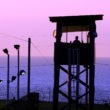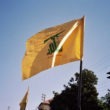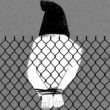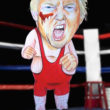Editor’s note: Margie Burns is an investigative writer who has reported for us in the past on election fraud, Bush family post-9/11 war profiteering, and the right-wing neocons who promoted the U.S. invasion of Iraq. Burns teaches at the University of Maryland in Baltimore, and she has recently been sitting in at the federal perjury trial of Vice President Cheney’s former aide and confidante I. Lewis “Scooter” Libby, Jr., which is winding to a conclusion as we go to press.
Besides presenting the regrettable spectacle of a parade of journalists being called to the stand to divulge their sources, the trial has focused on whether Libby lied to the FBI and a grand jury about his role in the leak of the covert identity of a CIA analyst. Burns, however, is interested in bigger lies—the pattern of lies that has come to define the Bush administration, especially the force field of manipulation and misdirection that emanates from the office of the vice president.
The Bush administration may be faulted for excessive slowness in fixing breaches of security—as blue-ribbon panels pointed out before and after 9/11, and as the Washington Spectatorhas discussed; or in rebuilding the Gulf Coast after Hurricane Katrina; or in bringing government entities together where lack of coordination affects public health and public safety. It may be moving slowly if at all to correct massive waste, fraud and abuse in spending on the wars in Iraq and Afghanistan. But nobody can claim that the administration was not quick off the mark in attacking Iraq.
On September 23, 2002, the well-respected Middle East Economic Survey, a finance and current affairs publication read throughout the petrochemical industry and the intelligence community, published the following excerpt from an Arabic-language London newspaper:
“Around 100 U.S./U.K. jet fighters 10 days ago bombed and destroyed airbases H-3 and al-Baghdadi in western Iraq, close to the Jordanian border. Earlier, on 5 August, the allied forces destroyed an air defense base in southwest Iraq, near the Saudi border. Reports indicate that the Iraqi forces have withdrawn from the air bases and the command and control centers that were bombed, and have been replaced by U.S. forces which have started repairing the bases to use them later. Before that, U.S. forces, supported by Turkish troops, penetrated northern Iraq and reached a distance of around 30km from Mosul and Kirkuk. The reports also indicate that the U.S. and allied forces are a few kilometers away from Basra, and U.S. and allied forces now occupy more than 15 percent of Iraqi territory.” [Emphasis added.]
At this time—September of 2002—when some of the highest-ranking figures in the administration were exaggerating the threat of Iraq and connecting Saddam Hussein to the fearsome image of a “mushroom cloud,” the MEES article, “30,000 Troops Already in Iraq,” contradicted this dire rhetoric. It noted that, actually, the U.S. had been able to move militarily into Iraq with impunity, mostly in the north.
It said, moreover, that a “second move” was on the horizon, and that “Basra, Najaf and Kerbala in the south, and Mosul and Kirkuk in the north” would soon be occupied. “From there, the road will be open to U.S. forces to move towards Baghdad and Tikrit from the west.”
THE SECRET PRE-WAR ACTION—Months before any official start to the Iraq War, as the above-mentioned article made clear, war was already being waged, “quietly, step-by-step, without a war declaration, and without much noise.” (The British press reported increasing attacks by U.S. aircraft in Iraq’s “no-fly” zone from April through June of 2002; according to the London Times, U.S. and British planes dropped twice as much ordnance on Iraq during the second half of 2002 as in all of 2001.) Yet Iraq did not publicize these facts to the international community, the article asserted, “for fear of the effect on the morale of its armed forces, or whatever is left of them.” So much for Saddam as another Hitler.
Of course, the U.S. public were not apprised of all this; but any suggestion that Bush and Cheney were somehow unaware of U.S. military actions inside Iraq would have to have been a polite fiction. The president is the Commander in Chief, and anyone in the administration could have read the MEES article. If then–Secretary of Defense Donald Rumsfeld had for some reason failed to inform the White House, everyone who briefed Bush and Cheney, or their Cabinet members, on intelligence matters six mornings a week could have incorporated American troop movements in Iraq into their briefing binders, and undoubtedly some did.
CIA manager Craig Schmall, a prosecution witness in the current federal trial of Lewis (“Scooter”) Libby, Vice President Cheney’s former chief of staff who is on trial for perjury and obstruction, has testified that he served as morning intelligence briefer for Libby and Cheney for several years. Schmall has also testified that he kept for his files the headings—the table-of-contents pages—from his briefing binders when he sent the contents of the binders to be burned or shredded.
Thus it should be easy to discover, given the political will to do so, “what the president knew, and when he knew it” in regard to military movements within Iraq and the threat realistically posed by that country.
But one thing the outing of Mrs. Joseph Wilson (Valerie Plame), the CIA operative and wife of the former ambassador to the African nation of Niger, reveals is how aggressively the administration targeted any contradiction of its cover story that Iraq maintained the capacity for apocalypse-dealing terror and was thus a threat to the entire Western world, one that had to be addressed by invasion by the U.S.
The focus in many news reports about the CIA leak so far has been on possible retaliation against Ambassador Wilson, whose July 6, 2003, Op-Ed article in the New York Times, entitled “What I Didn’t Find in Africa,” displeased the White House by debunking the story that Iraq was trying to purchase uranium from Niger. In the days following the publication of Wilson’s article, witnesses have testified, at least three administration officials told reporters that Wilson’s wife was a CIA operative. Other senior officials pushed media outlets to circulate the item that Mrs. Wilson worked for the CIA.
If the White House intended primarily to harm Wilson, it seems to have misfired. Wilson himself did not work for the CIA, and his career—he was already out of government—can hardly be said to have been damaged by his wife’s exposure. He received a book contract and a speaking tour after the fiasco. It was his wife and the CIA that chiefly suffered; Mrs. Wilson—a covert agent—lost her career; according to current and retired CIA officials, her intelligence contacts abroad were compromised and possibly exposed to danger; and her CIA front company, called Brewster Jennings and Associates, was also exposed and had to be disbanded.
Whatever work Brewster Jennings engaged in, precisely, the work pertained to counterproliferation of nuclear materials. The CPD unit, as it was called, in which Mrs. Wilson worked, was involved in monitoring the spread of weapons of mass destruction; according to trial testimony, the vast majority of employees in the unit were under cover.
ANATOMY OF A SCANDAL—The White House operation that exposed her was swift. According to Joe Wilson’s book The Politics of Truth, Wilson got in touch with an editor at the Times on or about June 9, 2003, and the editor offered him space of “fifteen hundred words to tell my story.” According to trial testimony, Libby learned that Mrs. Wilson worked at the CIA on approximately June 12, 2003, in a phone conversation with Vice President Cheney, as Libby’s notes from the conversation indicate. (About then, Republicans in Congress rejected demands for a formal probe into the intelligence leading up to war with Iraq.)
Things moved fast from that point on. The information about Mrs. Wilson’s secret CIA job was corroborated for Libby by other officials in the CIA and in the State Department. A couple of newspaper articles referred to Joe Wilson, though not by name, and to his trip to Niger. Then several newspapers ran articles critical of the entire administration “WMD” claims (sample headline: “Iraqi Mobile Labs Nothing to Do with Germ Warfare, Report Finds”). On June 14, retired CIA veteran Ray McGovern, a staunch opponent of the Iraq War, met with Wilson at a convention in D.C. and asked when he planned to go public with his Niger information; Wilson told him, in “about two weeks.” By that date, a secret U.S. unit had reportedly scoured Iraq and found no WMDs.
On June 23, New York Times reporter Judith Miller met with Libby, and he told her about Wilson’s wife, according to Miller’s court testimony; Washington Post reporter Bob Woodward has stated that the phrase “Joe Wilson’s wife” had also appeared in his notes by that time.
After Wilson’s New York Times article appeared on July 6, Wilson went on NBC’s TV programMeet the Press, hosted by Tim Russert, who later testified in the Libby trial; Wilson also gave an interview to the Washington Post. (Wilson says in an e-mailed response to questions that journalist Bob Woodward was not present for the Post interview.)
About one day later, White House Press Secretary Ari Fleischer mentioned Wilson’s wife and the CIA to NBC reporter David Gregory, who did not use the item; Fleischer took the Fifth Amendment but accepted immunity from prosecution to testify before a grand jury; another reporter testified that Fleischer also leaked the Plame item to him. The White House then retracted the claim that Iraq tried to purchase uranium from Niger, a claim based largely on forged documents that the CIA had previously rejected.
On about July 8 or 9, White House adviser Karl Rove had a conversation with syndicated columnist Robert Novak and confirmed to him that Mrs. Wilson worked for the CIA. On July 8, Lewis Libby held a two-hour conversation with journalist Judith Miller and again, according to Miller’s testimony, shared the information about Mrs. Wilson with her. On July 11, Rove held a conversation about Mrs. Wilson with a reporter from Time magazine, Matthew Cooper. The next day, a White House official discussed Joseph Wilson’s trip to Africa with Walter Pincus, aWashington Post reporter, dismissing it as a “boondoggle” arranged by Mrs. Wilson. In a flurry of unusual contacts with reporters, Libby himself also spoke with Cooper, according to the FBI account of his interview with the Bureau.
Novak’s column naming Mrs. Wilson as a CIA “operative” came out on July 14, Ari Fleischer’s last day as White House press secretary. Within days, news reports had become rife that the documents supporting the alleged Niger uranium deal were obvious forgeries; more Washington, D.C., reporters were coming forward with anecdotes about having been told about Mrs. Wilson; and Dr. David Kelly, a British scientist who questioned Iraq’s ability to employ WMDs, was found dead in England, an apparent suicide.
AN INSIDER’S ADMISSION—Remarkably, after months of controversy and investigation into the leak of Mrs. Wilson’s identity, former Deputy Secretary of State Richard Armitage came forward in September 2006 and shouldered the onus for outing her to Novak, an admission corroborated by Bob Woodward. Woodward’s court testimony involved a tape recording of Armitage telling him the same information, with expletives about Mrs. Wilson. Armitage said that the disclosure to Novak was unintentional.
Armitage’s extensive government résumé in security and defense, following military service in Vietnam, began while Donald Rumsfeld and Dick Cheney first worked in the White House under Richard Nixon. Armitage served with the U.S. Defense Attaché in Saigon until the fall of Saigon in 1975. Then Rumsfeld, as Secretary of Defense in the Ford administration, sent him to Iran as a Defense Department consultant. Armitage served in several positions in the Reagan administration in Middle East security policy, special operations and counter-terrorism. During the Bush senior administration, he served as special negotiator for military bases on the Philippines, was a Middle East negotiator, and headed U.S. efforts to aid the countries of the former Soviet Union, all under Cheney when Cheney was Secretary of Defense.
Press reports have linked Armitage with opposition to the Iraq War, but as a signatory to the Project for a New American Century (PNAC), he was listed along with Cheney and Rumsfeld and numerous other neocons calling on President Clinton to oust Saddam Hussein. Pitting Armitage “against” the neocons on the Iraq War is like pitting NBC’s Chris Matthews “against” NBC’s Tim Russert in their respective reporting on the Bush administration.
Armitage has not replied to requests by telephone and e-mail to comment on the Wilson matter. He has gone into private security consultancy since leaving the current administration in 2005. His company was named Armitage Associates LLC, with its northern Virginia headquarters in the same building that housed Kellogg Brown & Root, a Halliburton subsidiary, on Wilson Avenue. The current company name is just AALC, and the business press has reported that the company takes only jobs that would not pose a conflict of interest if Armitage were to return to government. Armitage was previously a director at CACI International, a large federal contractor besmirched by the Abu Ghraib prison abuse scandal. He has also been named to the boards of ManTech International, another northern Virginia defense contractor, and the oil company ConocoPhillips.
Through a succession of governmental posts, Armitage has by any standard become a well-connected man, associated for years with top administration figures, including Dick Cheney. President Clinton’s Secretary of Defense, William Cohen, named Armitage to the nine-member National Defense Panel, which issued key recommendations on defense. The panel was commissioned by Cheney when he was Defense Secretary and ultimately recommended privatizing functions of the Defense Department that have benefited Halliburton along with other major defense contractors.
To defend its intervention against the Wilsons, the administration has repeatedly said that Joe Wilson falsely claimed to have been sent to Africa by Vice President Cheney’s office. Wilson’s actual statement was that the trip was arranged by the CIA, following questions from the vice president’s office, but in any case Armitage’s well-timed, if belated, assumption of blame for the leak may help the White House to defuse controversy about what happened to Mrs. Wilson.
As trial testimony is clarifying daily, the Office of the Vice President has been all but openly the nexus linking the CIA leak, the run-up to the Iraq War, and consequent problems and abuses growing out of the war, including flagrant war profiteering. Thus far, efforts to make the key players more accountable have not progressed much. In an unpleasant echo of the run-up to the Iraq War, testimony in the Libby trial has now been used by the administration to draw attention to the purportedly grave security threats posed by Iran.
With any luck, the White House will not get the war with Iran it seems to want so badly. If it does succeed in widening the Iraq War, presumably it will notify Halliburton, which has done business with Iran, beforehand. But will the rest of us be notified?






0 Comments